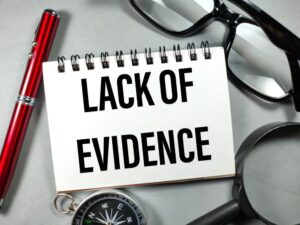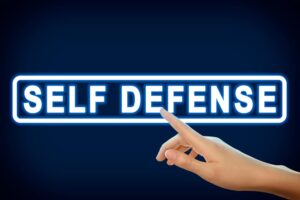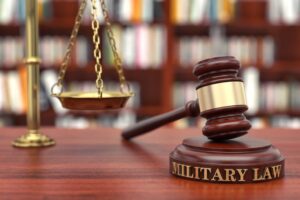Common UCMJ Defenses
If you’re a United States Armed Forces member, you’re subject to a unique set of laws known as the Uniform Code of Military Justice (UCMJ). The UCMJ governs the conduct of all service members and outlines the legal procedures for addressing alleged violations. If you find yourself facing charges under the UCMJ, it’s important to understand your rights and the potential defenses available to you. Seeking assistance from experienced UCMJ lawyers can greatly aid in navigating the complexities of military justice and protecting your rights
Lack of Jurisdiction
One of the first defenses to consider in a UCMJ case is whether the military court has proper jurisdiction over the alleged offense. The UCMJ applies to service members who are on active duty, as well as those who are on inactive duty training, such as reservists or National Guard members performing drill weekends.
However, there are some situations where the military may not have jurisdiction over a particular case. For example, if the alleged offense occurred while the service member was on leave or off-duty, and the offense has no connection to their military service, it may fall under the jurisdiction of civilian courts.
Additionally, if the military discharged the service member before discovering the alleged offense or bringing charges, it may no longer have jurisdiction over the case.
Suppose there are questions about the military’s jurisdiction in your case. Your defense attorney can investigate the alleged offense’s circumstances and argue for the case to be dismissed or transferred to a civilian court.
Lack of Evidence

In any criminal case, the prosecution bears the burden of proving the defendant’s guilt beyond a reasonable doubt. This means they must present sufficient evidence to support each element of the alleged offense.
If the prosecution lacks evidence to support their case, or if the evidence they do have is weak, contradictory, or unreliable, this can form the basis for a strong defense. Your defense attorney can challenge the prosecution’s evidence, expose inconsistencies or gaps in their case, and argue that they have not met their burden of proof.
Some common issues with evidence in UCMJ cases include:
- Lack of physical evidence: The prosecution may not have any tangible evidence, such as DNA, fingerprints, or video footage, to support its allegations.
- Unreliable witness testimony: If the prosecution’s case relies heavily on witness testimony, your defense attorney can challenge the credibility of those witnesses, expose any biases or motivations they may have, or highlight inconsistencies in their statements.
- Violations of your rights: If authorities collected evidence violating your constitutional rights, such as through an illegal search or seizure, your defense attorney can argue to exclude that evidence from the case.
Alibi
An alibi defense asserts that the accused was elsewhere when the alleged offense occurred and, therefore, did not have committed the crime. This defense requires strong evidence, such as witness testimony, video footage, or GPS records, to support the accused’s whereabouts at the relevant time.
If you have an alibi for the time of the alleged offense, share this information with your defense attorney as soon as possible. An attorney can investigate your alibi, gather supporting evidence, and present a compelling case for your innocence.
Mistaken Identity
The accused may claim that someone mistakenly identified them as the perpetrator of the alleged offense. This can happen when witnesses provide inaccurate or inconsistent descriptions of the suspect or when the investigation relies on flawed identification procedures, such as suggestive lineups or photo arrays.
Suppose mistaken identity is a potential issue in your case. Your defense attorney can challenge the reliability of witness identifications, highlight discrepancies in suspect descriptions, and present evidence to support your claim of innocence.
Lack of Intent
Many UCMJ offenses require the prosecution to prove that the accused acted with a specific intent or state of mind. For example, to prove theft, the prosecution must show that the accused intended to permanently deprive the owner of their property.
If the evidence suggests that you lacked the necessary intent to commit the alleged offense, this can form the basis for a strong defense. For example, if you took someone else’s property by mistake, believing it to be your own, your defense attorney can argue that you lacked the intent to commit theft.
Duress or Coercion
The defense of duress or coercion asserts that the accused committed the alleged offense only because they were under an imminent threat of death or serious bodily harm. To succeed with this defense, the accused must demonstrate that they believed the threat was genuine, that there was no reasonable opportunity to escape or avoid it, and that they committed the offense solely to avoid the threatened harm.
While duress or coercion can be a challenging defense to prove, it may be applicable in situations where the accused was acting under the orders of a superior officer or was facing extreme pressure or intimidation.
Insanity
The insanity defense rarely comes into play in UCMJ cases, but it may be appropriate if the accused was suffering from a severe mental disease or defect at the time of the alleged offense. As a result, they cannot appreciate the nature and quality of their actions or the wrongfulness of their conduct.
If you believe that your mental health may have played a role in the alleged offense, it’s essential to discuss this with your defense attorney. They can clarify the requirements for an insanity defense, gather relevant medical records and professional testimony, and present a compelling case for your lack of criminal responsibility.
Self-Defense

If you used force against another person because you reasonably believed it was necessary to defend yourself or others against an imminent threat of unlawful force, you may have a valid claim of self-defense. To succeed with this defense, you must show that you used only the force reasonably necessary to address the threat and did not have a safe opportunity to retreat or avoid the confrontation.
Statute of Limitations
Like most criminal codes, the UCMJ sets time limits for prosecuting various offenses. These statutes of limitations ensure that authorities bring cases promptly and that defendants do not have to defend against stale or outdated allegations.
If the alleged offense in your case occurred outside the applicable statute of limitations, your defense attorney can argue to dismiss the charges. It’s important to note, however, that some serious offenses, such as murder or rape, have no statute of limitations under the UCMJ.
Choosing the Right Military Defense Attorney
While understanding the common defenses available in UCMJ cases is important, choosing the right defense attorney to represent your interests is equally crucial. Military law is a complicated and specialized field; not all attorneys have the experience, knowledge, and skills necessary to handle military justice system cases effectively. Therefore, selecting a UCMJ lawyer who is well-versed in military law and has a proven track record of successfully defending clients in similar situations is essential. This choice can significantly impact your case’s outcome and future military career.
When selecting a military defense attorney, look for someone who has:
Extensive Experience Handling UCMJ Cases Similar to Yours
When facing charges under the UCMJ, choose a defense attorney who has extensive experience handling cases similar to yours. Every case is unique, but an attorney who has successfully navigated cases involving similar charges, fact patterns, or legal issues will be better equipped to build a strong defense strategy tailored to your specific needs.
An experienced military defense attorney will deeply understand the UCMJ and how it applies to your case. They will be familiar with the elements of the alleged offense, the potential penalties you may be facing, and the most effective strategies for challenging the prosecution’s evidence and arguments.
In addition to their knowledge of the law, an attorney with extensive experience handling UCMJ cases will also have practical skills and insights that can significantly affect the outcome of your case. They will know how to investigate the allegations against you, gather and analyze relevant evidence, and identify weaknesses in the prosecution’s case.
A Deep Understanding of Military Culture, Customs, and Procedures
In addition to their legal knowledge and experience, it’s important to choose a military defense attorney who deeply understands military culture, customs, and procedures. The military is a unique and complex institution with its language, values, and way of life. An attorney who understands this culture can relate to you as a client, communicate effectively with military personnel, and present your case in a way that resonates with military decision-makers.
An attorney with a deep understanding of military culture will appreciate the importance of honor, loyalty, and service and know how to frame your defense in a way that aligns with these values. They will understand the significance of your rank, duty position, and service record and can highlight the positive aspects of your military career in your defense.
Strong Communication Skills and a Commitment to Keeping You Informed and Involved in Your Case
Facing charges under the UCMJ can be an overwhelming and isolating experience. You may feel like your fate is out of your hands and have little control over the legal process. That’s why choosing a military defense attorney with strong communication skills and a commitment to keeping you informed and involved in your case is so important.
An attorney with strong communication skills will take the time to listen to your story, answer your questions, and explain the legal process in a way you can understand. They will be patient, empathetic, and responsive to your needs, ensuring you feel heard and supported throughout your case.
A Track Record of Success in Achieving Favorable Outcomes for Their Clients
When your future and freedom are on the line, you want a military defense attorney with a proven track record of success in achieving favorable outcomes for their clients. While every case is unique, and no attorney can guarantee a specific result, an attorney with a history of positive outcomes in UCMJ cases can give you confidence that your case is in good hands.
A successful military defense attorney will have experience winning cases at all stages of the legal process, from pre-trial negotiations to court-martial proceedings and appeals. They will know how to build a strong defense strategy, challenge the prosecution’s evidence, and advocate persuasively for your interests.
Positive Reviews, Recommendations, and Testimonials from Past Clients and Colleagues

When choosing a military defense attorney, one of the most valuable sources of information can be the reviews, recommendations, and testimonials of their past clients and colleagues. These firsthand accounts can offer insight into an attorney’s skills, experience, and approach to client service, aiding you in deciding whether they are the right fit for your case.
When evaluating potential attorneys, look for reviews and testimonials that speak to their legal knowledge, communication skills, and commitment to client service. Pay attention to comments about their ability to achieve favorable outcomes, responsiveness to client needs, and overall professionalism and dedication.
In addition to client reviews, you may also seek recommendations and testimonials from an attorney’s colleagues and peers in the legal community. These endorsements can offer valuable insight into an attorney’s reputation and standing within the military justice system, allowing you to gauge their experience level.
When reading reviews and testimonials, remember that every case is unique and that past results do not guarantee future outcomes. However, a consistent pattern of positive feedback and satisfied clients indicates an attorney’s ability to provide effective representation and achieve favorable results. Additionally, these insights can allow you to understand the attorney’s strengths, such as communication, thoroughness, and dedication, which are crucial in successfully navigating the legal process.
Contact a Military Defense Attorney
If you’re facing charges under the UCMJ, don’t wait to seek legal help. The sooner you involve a skilled military defense attorney, the better your chances of building a strong defense and achieving a positive resolution to your case. A qualified military defense lawyer can thoroughly evaluate your situation, strategize an effective defense plan, and navigate the complexities of military law to protect your rights and future. Contact a military defense lawyer today to schedule a consultation, discuss your legal options, and take proactive steps toward securing a favorable outcome.
